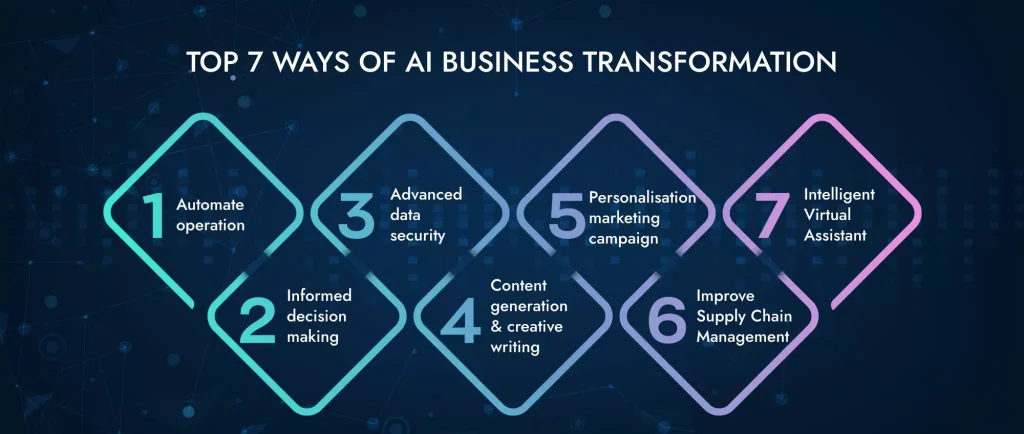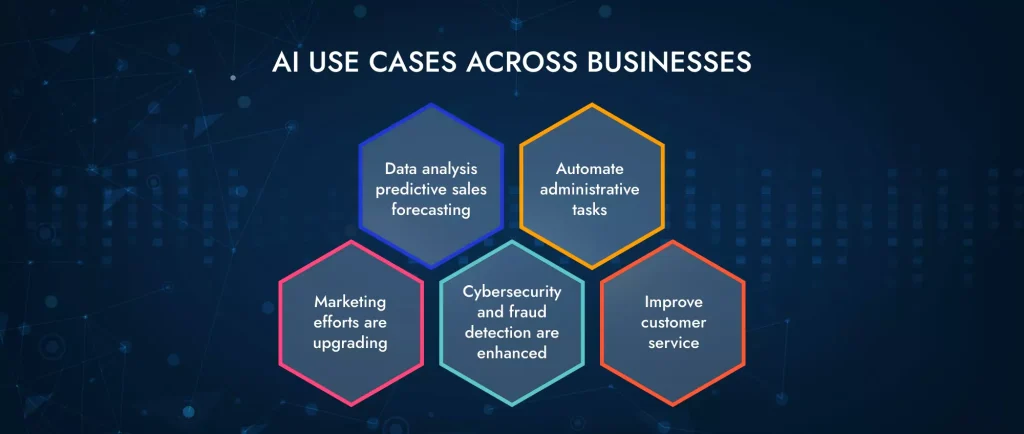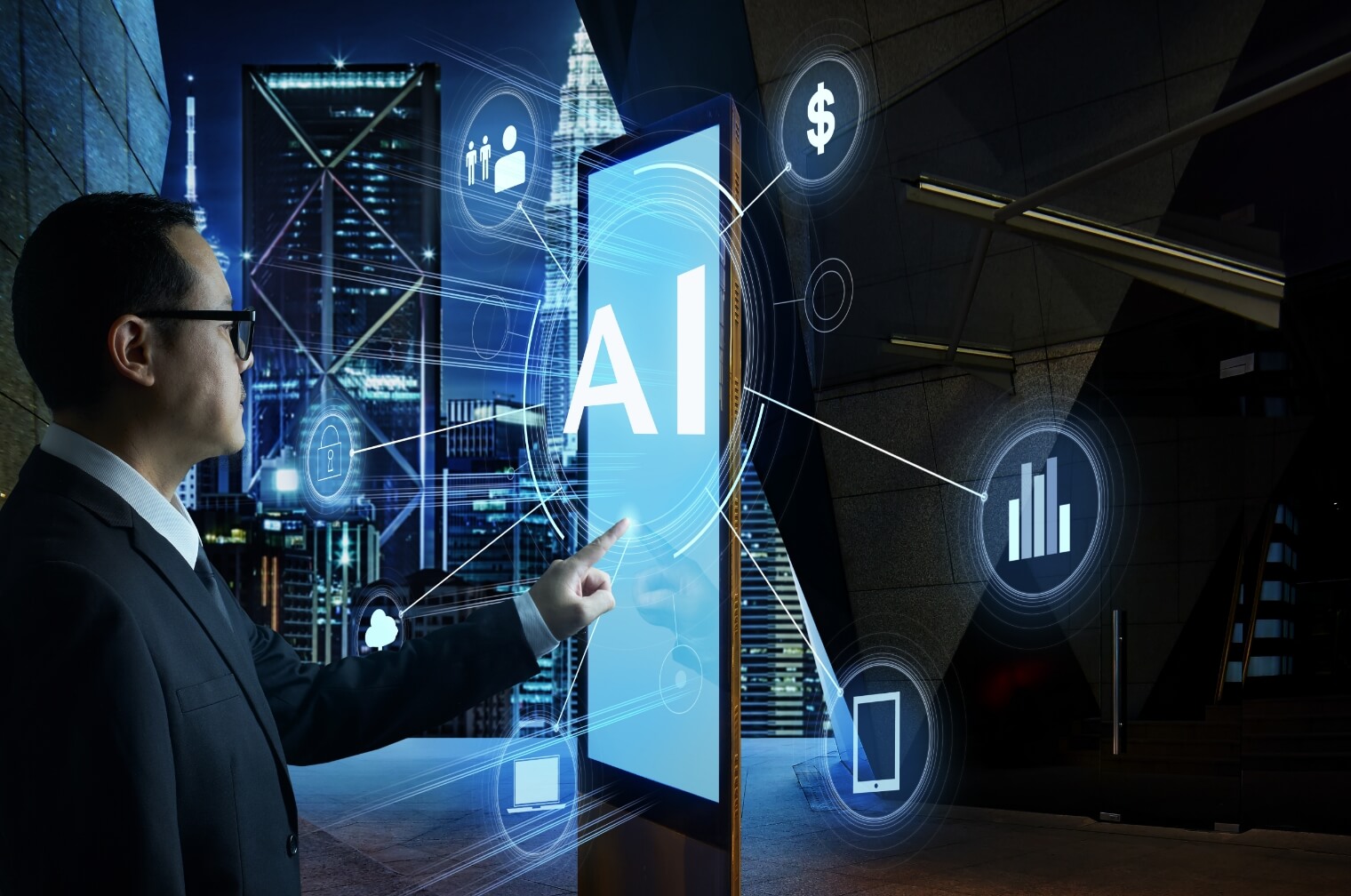Artificial intelligence is changing the way businesses work. It changes the decision-making process, optimizes workflow, and streamlines operations. One of the key areas in which AI is changing is data analysis. It is the area where large data is available, so with data analysis, businesses gain insights into customer behavior, market trends, and business operations. It allows businesses to make decisions regarding customer selling and business plans. Also, it satisfies the customers with personalized recommendations. Additionally, it improves overall productivity and efficiency in the business.
Let’s dive into the AI business transformation world, provide use cases of AI in business, and explain how AI helps grow businesses and applications to use in AI.
How AI is transforming business intelligence
AI is changing how the business world operates. The AI-based cloud platform manages and analyses large amounts of data. It analyses customer data and sales from websites, apps, and other databases. This information you can gather in business operations, from computers and mobile devices to production equipment, financial transactions, and sensors. From there, you can analyze patterns, key trends and irregularities and rectify them where required. This is the way AI works in the business world.
For example, a manager in a factory uses AI to monitor their assembly line equipment, and the AI identifies that the problem is slowing down production. It informs managers and recommends specific action regarding slowing down production from part replacement to equipment serving.
Top 7 ways of AI business transformation
AI is the present and future of the digital market, making it essential for the company to integrate AI into the business so that your business stays ahead of competitors.

Automate operation
Businesses have to do a lot of tasks daily. AI helps automate the operation tasks so the workforce can be free from simple tasks and focus on complex tasks; this is mainly useful to customer support. Instead of doing simple tasks of answering every customer query, they can use chatbots to focus on complex marketing tasks.
AI helps minimize human errors and provides accuracy to businesses. When businesses automate their tasks more, they will achieve efficiency and improve productivity. This is the way AI business transformation is possible with automation.
Informed decision making
Collecting and analyzing the data took a lot of work before AI and machine learning. AI and machine learning make it easy to collect and analyze raw data. The data analysis helps predict the future, identify trends, and suggest the right action plan to help businesses achieve their goals. Hence, AI is faster and more accurate, saving time and resources wasted in manual work. This way, AI in business assists in making informed decisions.
Advanced data security
Artificial intelligence in business transformation uses an AI-powered system that prevents cyber threats, detects fraud, identifies suspicious issues, and responds to security issues quickly. As a result, business data is secured and remains confidential. Also, it maintains customer trust, and things work per data protection regulations.
Content generation and creative writing
Content generation is time-consuming for businesses as they must spend much time researching and writing content. Generative AI automates the content generation process, which helps companies to generate articles, blogs, and other written materials. This technology provides a consistent flow of content to businesses and engaging content to audiences.
Content generation tools like Chatgpt and Google Bard provide content in minutes. Instead, human beings need to work for the same content for hours. It saves time and improves productivity in the business.
Personalization marketing campaign
Artificial intelligence helps businesses deliver personalized marketing campaigns. AI can collect and analyze a large amount of customer data, where they learn customer behavior, purchase history and demographic behavior, which helps create personalized recommendations and target advertisements.
This personalization improves customer engagement, increases conversion rates, and provides revenue growth. This is the way AI business transformation is possible.
Improve supply chain management
AI can help businesses improve supply chain management by gathering and analyzing data. The AI optimizes the supply chain by identifying waste areas and monitoring inventory and areas of inefficiency. Other than that, the business identifies the risks that may occur in the future by analyzing the data to optimize delivery time, warehouse space, inventory and more. It is the way businesses reduce unnecessary costs, improve productivity, and maximize profits.
Intelligent virtual assistant
An Intelligent virtual assistant is an AI software that engages customers in conversational ways as AI can provide personalized insights to customers. Also, AI is available 24/7 with no downtime.
The virtual assistant helps handle tasks such as scheduling meetings and answering inquiries. As a result, employees are free from simple tasks and can focus on more critical activities. This way AI transforming business with virtual assistants.
AI use cases across businesses
The AI tools in full potential use are voice assistants, chatbots, and facial recognition for security and fraud detection. These AI tools help enhance productivity, save money, and help grow business. Let’s know in detail about AI use cases across various businesses.

Data analysis predictive sales forecasting
AI tools can collect large amounts of data, analyze past trends, and behavior and analyze sales data to predict future sales. Because of this, businesses can manage resources effectively. Also, it provides a competitive edge and enhances businesses’ decision-making process.
Automate administrative tasks
The administrative tasks consumed a lot of time. The tasks such as data entry, scheduling, and report generation. AI automation has streamlined the process and improved productivity. Also, AI-powered tools help monitor the tasks to ensure they are completed on time and accurately. Tools like Automation Edge, zapier, Uipath, etc are useful.
Marketing efforts are upgrading
AI helps upgrade marketing efforts by creating compelling copy visual content and personalizing customer interaction. Additionally, AI helps create landing page copy for email marketing lists, runs campaigns, and converts customers to leads.
This is possible because AI provides insights into customer behavior, personalized content and marketing and automates daily tasks like email marketing and ad placements. This is the way AI business strategies work.
Cybersecurity and fraud detection are enhanced
Cybersecurity and fraud detection are challenging for businesses in the digital world. AI tools with machine learning algorithms can provide cybersecurity and detect fraud in advance. Fraud, such as anomalies, can be detected, and quick responses to threats are possible with AI.
Detection is possible for AI because it collects large amounts of data and learns patterns of normal and suspicious activities.
Improve customer service
AI improves customer service through personalization recommendations predictive and sentiment analysis. For instance, 35% of Amazon’s shopping took place based on personalization recommendations from AI. This AI improves productivity and efficiency in customer service. This is the way AI business strategies work in customer service.
The growth of AI for businesses
According to the global AI market’s recent statistics, AI can reach $738.8 billion by 2023, at a CAGR of 17.30%. Here, AI will be helpful in industries such as customer service, healthcare, education, logistics, and software development. Let’s understand how AI will help grow these industries.
The global AI market’s value as of 2023 is $142 billion, and it is expected to reach $1.59 trillion by 2030.
Healthcare
AI integration in healthcare transforms the business. Business transformation is possible by improving patient outcomes, advancing research, and managing patients’ medicine. AI analyses the patient’s past data and current symptoms and discovers the patient’s problems. Once the problem is known, personalized treatment with genetic information is suggested.
Customer service
Improvement in customer service is possible with artificial intelligence. The AI helps analyze customer behavior, preferences, and habits based on past data and recommend products that satisfy customers. One of the known brands, amazon is using this strategy of personalization recommendation.
Education
AI for business transformation works as a game changer in the education industry. In education, AI combines the machine and the teacher to provide personalized education to students. It analyses the student learning preferences, and patterns and provides them with effective learning experiences as per their needs. For example, Coursera offers personalized education for students, which engages them in studying.
Logistics
Machine learning algorithms in the supply chain help analyze past and real-time data for delivery routes. When delivery routes are short, it saves fuel consumption and improves operational efficiency. AI can automate the sorting task in disturbing processes, track the supply, and handle the package efficiently to complete logistics work.
Software development
In software development, AI will automate repetitive tasks such as testing, debugging and code reviews. It saves the developer time on such simple tasks, and they can focus on more critical development tasks. When the developer is focused on essential tasks, the development work will be faster and provide quality software.
What are the top applications of AI in business?
AI development services are helpful in business for different purposes. Let’s look into the top applications of AI in real-world examples.
- Google Maps uses AI to analyze satellite data and provides you with updated information about traffic conditions and delays. AI automatically updates business hours and speed limits, allowing users to plan their day per the latest information. This way, Google Maps uses artificial intelligence and business strategy together in their business.
- Netflix uses AI to study user habits and behavior for personalization recommendations. These help Netflix satisfy its customers and increase sales. This way Netflix uses artificial intelligence and business strategy in their business.
- Apple, one of the leading mobile brands, uses AI technology. It uses AI technology in features such as autocorrect text, automatic noise canceling, and facial recognition. This way, Apple uses artificial intelligence and business strategy in its business.
Automate and advance your business with AI solutions that follow your business needs
How does VittorCloud help businesses in AI transformation?
AI is transforming business in such a way that it increases productivity and improves workplace efficiency. It improves efficiency in customer support departments, recruitment, data analysis, and other work. Therefore, businesses need to use AI for business transformation.
Our AI services ensure our clients that we will transform their business as per their needs and business goals. We conduct in-depth consultations to understand our client’s needs and business goals.
Collaborate with us to develop customized AI models for your business. Integrate the developed AI model in your business operations, and transform it to the next level.
Frequently asked questions
AI-driven transformation impacts businesses such as healthcare, finance, retail and eCommerce, manufacturing, logistics, marketing, and education, etc.
AI business transformation is possible with automation, advanced security, fraud detection and risk management, personalization marketing campaigns, recruitment and talent sources.
AI has changed how business operations work as it automates repetitive tasks, enhances the decision-making process, and improves the efficiency of businesses.
Businesses ensure successful AI integration with clear objectives, develop a culture of innovation, get quality data, and invest in talent and training. Also, monitor the performance of AI.

Vishal Patel
Vishal Patel is an experienced Solution Consultant with a proven track record in the information technology and services industry.
